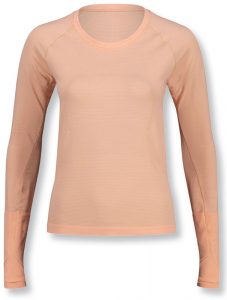 Samsara Eco’s partnership with apparel brand lululemon moves circular nylon closer to reality.
Samsara Eco’s partnership with apparel brand lululemon moves circular nylon closer to reality.
By Rachael S. Davis, Executive Editor
It’s not too long ago that the term molecular recycling entered the textile vernacular. In a depolymerization process, the technology breaks down hard to recycle items and mixed plastic waste streams into their molecular building blocks enabling a second life for items beyond plastic bottles that have typically been recycled using mechanical methods. Together, the two recycling technologies —molecular and mechanical — may make it possible to eventually repeatedly recycle most textile waste to create a fully circular economy.
While several companies now have technologies to depolymerize a wide variety of plastics — including polyester, high density polyethylene, polypropylene and other plastics — nylon was missing from the equation … until now.
Samsara Eco is an Australia-based company that has developed Eos Eco, a patent-pending, enzyme-based technology that can extract nylon 6,6 from end-of-life textiles and reuse it in a fully circular ecosystem. Similar to other molecular recycling technologies, Samsara Eco’s process generates virgin-grade products, and can be used repeatedly with no degradation or quality loss. “Our enzymatic recycling is the only solution on the market that allows the textile industry to unlock nylon 6,6 amongst mixed feedstocks to prevent textiles from ending up in landfills,” explained Sarah Cook, chief commercial and operations officer of Samsara Eco.
Canadian/American athletic apparel brand lululemon partnered with Samsara Eco last year — the brand’s first-ever minority investment in a recycling company. The two companies are now working together to develop recycled nylon and polyester products from clothing waste. lululemon uses nylon 6,6 in many of its garments — including its Swiftly Tech Long-Sleeve Top, and Align and Wunder Train leggings — because of its high-performance properties in athletic apparel. The partnership with Samsara Eco moves lululemon closer to its goal of making 100 percent of its products using preferred materials and end-of-use solutions by 2030.
The companies recently debuted samples of lululemon’s Swiftly Tech top comprised of more than 90-percent enzymatically recycled nylon 6,6 from Samsara’s Eos Eco process. Lululemon reports the samples feel the same, fit no differently, and carry the same quality its customers expect from its apparel.
“The lululemon Swiftly top samples go beyond material innovation — they represent the exciting possibilities and impact that can be achieved through collaboration and cross-industry partnership,” said Yogendra Dandapure, vice president, Raw Materials Innovation at lululemon. “This breakthrough not only signals a turning point for sustain-able innovation in apparel, but for all industries looking to shift towards more circular models. We look forward to continuing to work with Samsara Eco to help scale this new technology in the months and years ahead.”
“Our work with lululemon represents a groundbreaking step forward in tackling the challenge of textile waste and demonstrates the potential to create a fully circular ecosystem for apparel,” said Paul Riley, CEO and founder of Samsara Eco. “We’ve started with nylon 6,6, but this sets the trajectory of what’s possible for recycling across a range of industries as we continue expanding our library of plastic-eating enzymes. This is an incredibly significant moment for the future of sustainable fashion and circularity.
For more information, visit corporate.lululemon.com/our-impact and samsaraeco.com.
March/April 2024




